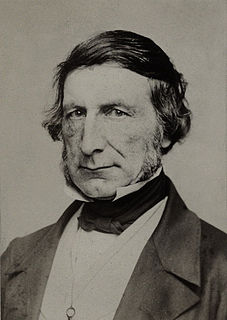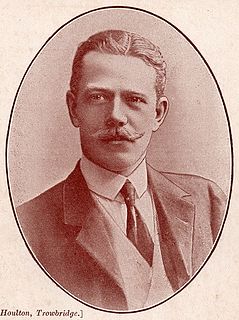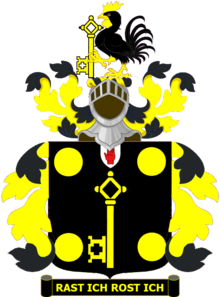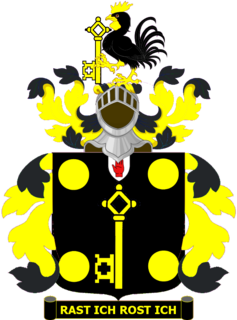Baron Dulverton, of Batsford in the County of Gloucester, is a title in the Peerage of the United Kingdom. It was created in 1929 for the businessman Sir Gilbert Wills, 2nd Baronet. He was President of the Imperial Tobacco Company and also sat as a Conservative Member of Parliament for Taunton and Weston-super-Mare. The Wills Baronetcy, of Northmoor in the County of Somerset, was created in 1897 for his father Frederick Wills. He was a director of W. D. & H. O. Wills, which later merged into the Imperial Tobacco Company, and also represented Bristol North in Parliament as a Liberal Unionist. A member of the wealthy Bristol tobacco importing Wills family, he was the younger brother of Sir Edward Payson Wills, 1st Baronet, a half brother of Sir Frank William Wills Kt., and the cousin of William Wills, 1st Baron Winterstoke. In 1966 the Wills family had contained the largest number of millionaires in the British Isles, with 14 members having left fortunes in excess of one million pounds since 1910, totalling £55 million. As of 2014 the titles are held by the first Baron's grandson, the third Baron, who succeeded his father in 1992.

Baron Phillimore, of Shiplake in the County of Oxford, is a title in the Peerage of the United Kingdom. It was created in 1918 for the former Judge of the High Court of Justice and Lord Justice of Appeal, Sir Walter Phillimore, 2nd Baronet. The Phillimore Baronetcy, of The Coppice, had been created in the Baronetage of the United Kingdom on 28 December 1881 for his father Sir Robert Phillimore, who was also a noted lawyer and judge. The first Baron was succeeded by his son, the second Baron.

Baron Churston, of Churston Ferrers and Lupton in the County of Devon, is a title in the Peerage of the United Kingdom. It was created in 1858 for the former Conservative Member of Parliament, Sir John Yarde, 3rd Baronet. He had earlier represented South Devon in the House of Commons. Two years later, in 1860, he assumed by Royal licence the additional surname of Buller. As of 2014 the titles are held by his great-great-great-grandson, the fifth Baron, who succeeded his father in 1991.
There have been two baronetcies created for persons with the surname Hobart, one in England and one in the United Kingdom.

There have been three baronetcies created for persons with the surname Croft, one in the Baronetage of England and two in the Baronetage of the United Kingdom. All three creations are extant as of 2008.
Viscount D'Abernon, of Esher and of Stoke d'Abernon in the County of Surrey, was a title in the Peerage of the United Kingdom. It was created on 20 February 1926 for the politician, diplomat and writer Edgar Vincent, 1st Baron D'Abernon who had been created Baron D'Abernon, of Esher in the County of Surrey, on 2 July 1914. In 1936 he succeeded his elder brother as sixteenth Baronet, of Stoke d'Abernon. All three titles became extinct on his death in 1941.

There have been three baronetcies created for members of the Grey family, one in the Baronetage of England, one in the Baronetage of Great Britain and one in the Baronetage of the United Kingdom. Two of the creations are extant as of 2007.

The Rawlinson Baronetcy, of North Walsham in the County of Norfolk, is a title in the Baronetage of the United Kingdom. It was created on 7 February 1891 for the orientalist, archaeologist and politician Henry Rawlinson. His son, the second Baronet, was a distinguished soldier. On 6 October 1919 he was raised to the Peerage of the United Kingdom as Baron Rawlinson, of Trent in the County of Dorset. On his death on 26 March 1925 the barony became extinct, while the baronetcy passed to his younger brother, the third Baronet.

There have been seven Baronetcies created for persons with the surname Lewis, two in the Baronetage of England and five in the Baronetage of the United Kingdom. Only one creation is extant as of 2010.

There have been two baronetcies created for persons with the surname Hanson, both in the Baronetage of the United Kingdom. One creation is extant as of 2010.

There have been two baronetcies created for the Guise family, one in the Baronetage of England and one in the Baronetage of Great Britain. The latter creation is extant as of 2014.
The Buzzard Baronetcy, of Munstead Grange in the Parish of Godalming in the County of Surrey, is a title in the Baronetage of the United Kingdom. It was created on 25 June 1929 for the prominent physician Sir Farquhar Buzzard. He was Regius Professor of Medicine at the University of Oxford from 1928 to 1943 and Physician-in-Ordinary to King George V from 1932 to 1936. Buzzard was succeeded by his eldest son, the second Baronet. He was a Rear-Admiral in the Royal Navy. As of 2007 the title is held by his eldest son, the third Baronet, who succeeded in 1972.
There have been five baronetcies created for persons with the surname Richardson, one in the Baronetage of Nova Scotia, one in the Baronetage of Ireland and three in the Baronetage of the United Kingdom.

There have been eight baronetcies created for persons with the surname Wilson, one in the Baronetage of Ireland and six in the Baronetage of the United Kingdom.
The Hogg, later Lindsay-Hogg Baronetcy, of Rotherfield Hall in Rotherfield in the County of Sussex, is a title in the Baronetage of the United Kingdom. It was created on 22 December 1905 for Lindsay Hogg, Conservative Member of Parliament for Eastbourne from 1900 to 1906. He assumed by Royal licence the additional surname of Lindsay before that of Hogg in 1906.
There have been three baronetcies created for persons with the surname Sanderson, two in the Baronetage of Great Britain and one in the Baronetage of the United Kingdom. One creation is extant as of 2007.
There have been three baronetcies created for persons with the surname Denny, one in the Baronetage of England, one in the Baronetage of Ireland and one in the Baronetage of the United Kingdom. As of 2014 two of the creations are extant.

Sir John Michael Fleetwood Fuller, 1st Baronet was a British Liberal Party politician and colonial administrator.

The Wombwell Baronetcy, of Wombwell in the County of York, is a title in the Baronetage of Great Britain. It was created on 26 August 1778 for George Wombwell, Chairman of the Honourable East India Company and Member of Parliament for Huntingdon. The fourth Baronet fought in the Crimean War and took part in the Charge of the Light Brigade and in 1861 served as High Sheriff of Yorkshire. As of 13 June 2007 the presumed seventh and present Baronet had not successfully proven his succession to the title, and is therefore not on the Official Roll of the Baronetage, with the baronetcy considered dormant since 1977.

There have been four baronetcies created for persons with the surname Martin, one in the Baronetage of England, one in the Baronetage of Great Britain and two in the Baronetage of the United Kingdom. All creations are now extinct.















